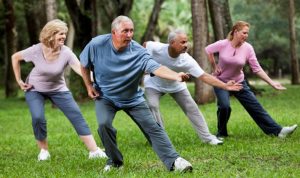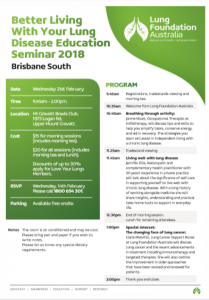Keeping warm as the temperature drops morning and afternoon is key to staying well this week in Brisbane but we also need to keep an eye on our friends and family for symptoms that could be ignored as a simple cold.
Awareness of the symptoms Pneumonia, a serious condition, is one way you can help those you know and love who are considered to be at risk – those with a chronic medical condition, a smoker, if they are 65 years or under 12 months of age.
Encourage them to get a medical check up with their practitioner if – difficulty breathing; fever; chest pain; cough; and fatigue. And if in doubt get it checked out, anyway.
For more information you can find a brochure on the Lung Foundation website at: www.lungfoundation.com.au/wp-content/uploads/2018/03/Lung-Foundation_Infographic_Pneumonia_Final.pdf






